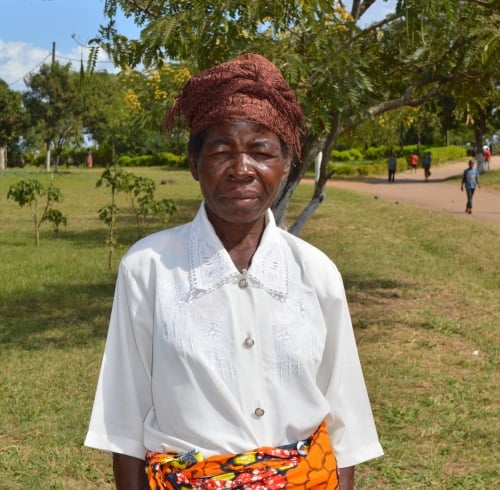“Assisting the women in my community suffering from obstetric fistula became my quest after suffering from obstetric fistula for 11 long years,” said Luciana, 48. This brave woman, who was operated on eight times before her fistula was repaired in 2006, was addressing a large crowd at an event on International Day to End Obstetric Fistula in Namathanda District in Sofala Province, Mozambique.
Luciana a participant in a UNFPA-supported social reintegration pilot led by the Ministry of Gender, Children and Social Action in Namathanda District. She is also working determinedly as a fistula activist to encourage women living with fistula in her community to go for treatment.
Dr. Silva Chironda, who has become one of Luciana’s special heroes after successfully undertaking her difficult fistula repair, encouraged her on her return home to take on the responsibility of urging women and girls suffering from fistula in her community to go for treatment.
A change maker
 Luciana, 48, is grateful for the support she received in healing her fistula. Photo: UNFPA Mozambique / Helene Christensen |
Luciana spent 11 years in and out of hospital, during which she leaked urine constantly and had difficulty assisting her family with their farming work. Her work in the community has given her life new meaning: “I share my story of being cured [of fistula] with the women and girls in my community, which inspires them to follow in my footsteps,” says Luciana.
In collaboration with religious and local leaders in her community, she facilitates community discussions on this particular childbirth injury to break the silence and stigma surrounding it. She walks from door to door to find and speak to women and girls who suffer from fistula – but deep-rooted cultural norms and beliefs often stand in her way: “Women are scared of going to hospital and some believe they will die on the operating table,” she explains.
Circle of empowerment
Many women in Namathanda who have suffered from fistula have sought help at the hospital because of Luciana’s tireless efforts. One of them is Maria, 30, who suffered from fistula for 15 years. Her husband had left her and she was living in near isolation in her sister’s home. After several attempts at consulting the traditional healer, she was relieved to find Luciana on her doorstep. “I never believed that I would be cured. Luciana helped change my life,” she says.
Women and girls living with fistula are among the most marginalized and neglected. The persistence of obstetric fistula is an illustration of serious inequalities and the denial of girls’ and women’s rights and dignity. After living in isolation and oftentimes being discriminated against in the community, women appreciate being taken under Luciana’s wing.
“Women find strength and courage when they come together with other women also suffering from fistula. They realize they are not alone,” Luciana explains.
Reintegrating with dignity
Apart from the emotional healing that the women in Namathanda gain from the discussions led by Luciana, the dignity of fistula survivors is being restored through the social reintegration pilot.
“Women who are cured from obstetric fistula need income-generating opportunities to sustain themselves,” says Luciana. The pilot aims to equip fistula survivors with the skills needed and support to start small businesses in their community, to enable them to once again enjoy a life of dignity.
By Helene Christensen, UNFPA Mozambique



